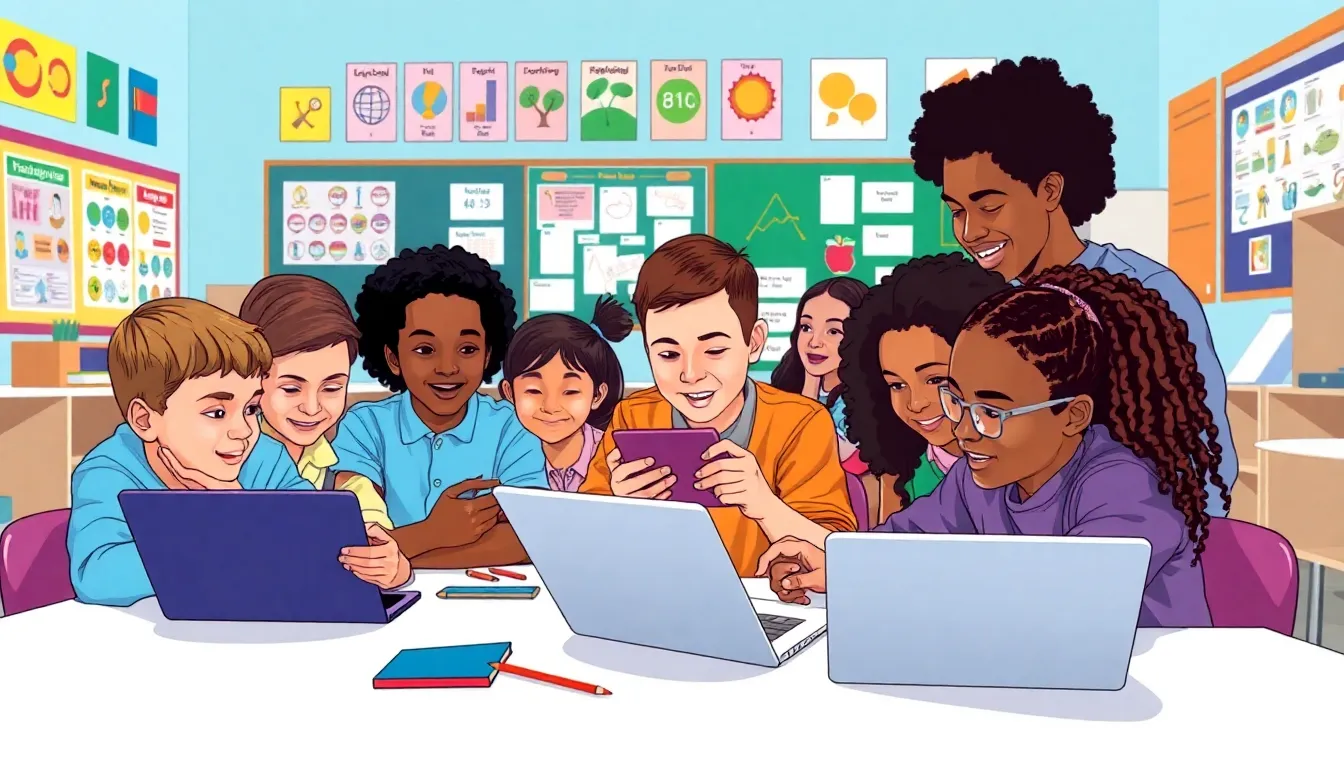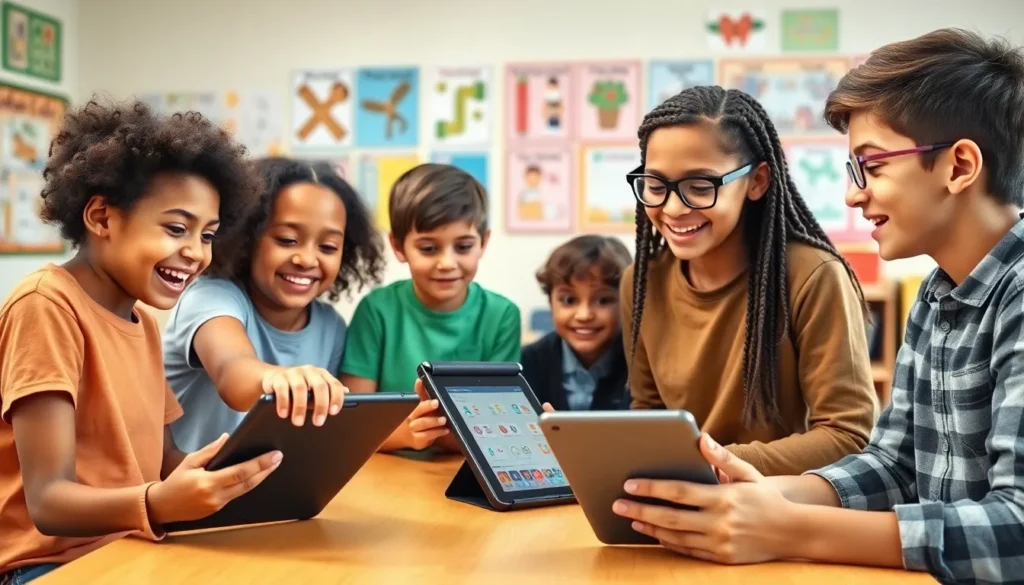In a world where learning often feels like a chore, edtech games swoop in like a superhero with a cape made of pixels. These innovative tools transform mundane lessons into thrilling adventures, engaging students in a way that textbooks simply can’t. Imagine mastering math while battling dragons or exploring history through epic quests—who knew education could be this fun?
Table of Contents
ToggleUnderstanding Edtech Games
Edtech games integrate educational content with interactive play, enhancing the learning experience. These games leverage technology to create engaging environments where students actively participate in their education.
Definition and Purpose
Edtech games represent a fusion of gaming and education. They aim to make learning more appealing through interactive formats. By using game mechanics, these educational tools encourage motivation and curiosity among students. Their purpose revolves around facilitating learning without the confines of traditional methods. Furthermore, such games often allow for personalized learning paths, accommodating different learning styles.
Importance in Education
Edtech games play a crucial role in modern education. They help students develop critical thinking and problem-solving skills. Students engaged in these games often demonstrate better retention of information compared to traditional methods. Data shows that 80% of students reported increased interest in subjects after using edtech games. Additionally, these games foster collaboration and communication skills as students often work together to solve challenges. Edtech games ultimately pave the way for more dynamic educational experiences.
Types of Edtech Games

Edtech games encompass various types that cater to different educational needs. Two prominent categories include interactive learning games and educational simulations.
Interactive Learning Games
Interactive learning games engage students in the learning process through challenging and entertaining gameplay. These games often incorporate quizzes, puzzles, and skill-based tasks that require critical thinking and quick decision-making. Examples include Kahoot! and Quizizz, where students compete while learning in a lively environment. Students benefit from immediate feedback, allowing them to track their progress effectively. Studies have shown that 70% of participants experience improved retention rates when using interactive learning games compared to traditional methods. Thus, these games transform lessons into dynamic experiences, making learning enjoyable and effective.
Educational Simulations
Educational simulations provide realistic scenarios that mimic real-world situations, allowing students to apply knowledge in practical contexts. Games like SimCity and PhET Interactive Simulations help learners grasp complex concepts by simulating environments and ongoing challenges. Students can experiment with different strategies, deepening their understanding of subjects like science, history, and engineering. In this context, they develop problem-solving skills while collaborating with peers. Research indicates that 85% of users report enhanced comprehension through simulations, highlighting their effectiveness in fostering insightful learning experiences. Overall, educational simulations bridge the gap between theory and practice, creating a rich learning landscape.
Benefits of Edtech Games
Edtech games provide numerous advantages that enhance the educational experience. Through innovative design and interactive elements, these games contribute significantly to student development.
Enhanced Engagement
Engagement levels increase when students participate in edtech games. Classic rote learning transforms as students immerse in gameplay, making lessons captivating. Attention shifts from passive to active participation, fostering a sense of involvement in their education. Interactive learning experiences tend to motivate learners, with 80% of students expressing heightened interest in subjects they initially found challenging. Enjoyable gaming mechanics encourage exploration, enabling students to pursue their curiosity. Learning that feels like play stands out in traditional educational settings, capturing attention effectively.
Improved Learning Outcomes
Learning outcomes improve when students use edtech games. These games promote retention, with research showing that 70% of participants retain information more effectively through engaging play rather than traditional methods. Critical thinking and problem-solving skills develop naturally as students navigate challenges in entertaining environments. Practical application of knowledge occurs in educational simulations, where 85% of users report enhanced understanding and real-world relevance. Personalized gaming experiences allow students to progress at their own pace, ensuring mastery of concepts before moving forward. Students often leave with a deeper knowledge base, ready for future academic challenges.
Challenges in Implementing Edtech Games
Edtech games present several challenges that educators must navigate to ensure effective integration in the classroom.
Accessibility Issues
Accessibility remains a significant hurdle for many educators. Not all students possess the same level of access to technology, creating disparities in learning opportunities. According to the National Center for Education Statistics, 14% of households with school-aged children lack internet access, impacting participation in edtech games. Additionally, some games are designed without considering different learning needs, excluding students with disabilities. This gap in accessibility can hinder overall engagement and learning for those without the necessary tools or support.
Balancing Entertainment and Education
Striking a balance between entertainment and education is crucial. While edtech games aim to engage students, they can sometimes prioritize fun at the expense of educational value. Games designed purely for entertainment often fail to meet curriculum standards or reinforce key concepts, leading to superficial learning experiences. Teachers must select games that align educational goals with engaging gameplay to maintain focus. A successful edtech game should appeal to students while enriching their understanding of the subject matter, ensuring that learning remains the primary aim.
Edtech games are reshaping the educational landscape by making learning an engaging and interactive experience. They not only enhance student motivation but also foster essential skills like critical thinking and collaboration. By integrating fun with educational content, these games cater to diverse learning styles and promote a deeper understanding of subjects.
While challenges such as accessibility and the need for curriculum alignment exist, the benefits of edtech games are undeniable. They create dynamic environments where students can thrive, ensuring that education remains relevant and effective in today’s fast-paced world. Embracing these innovative tools can lead to a more enriched learning journey for all students.




